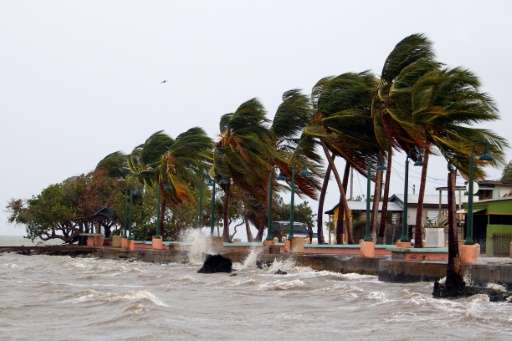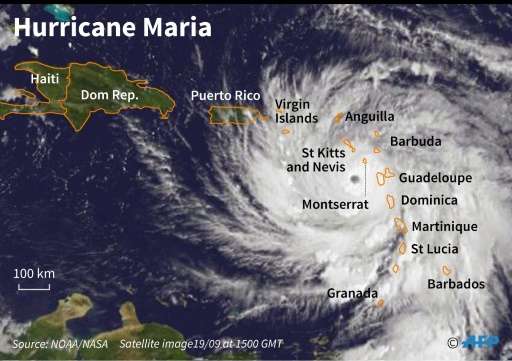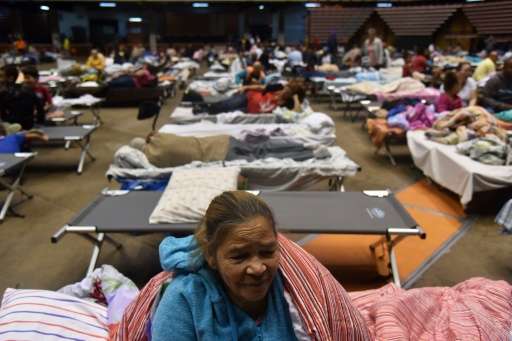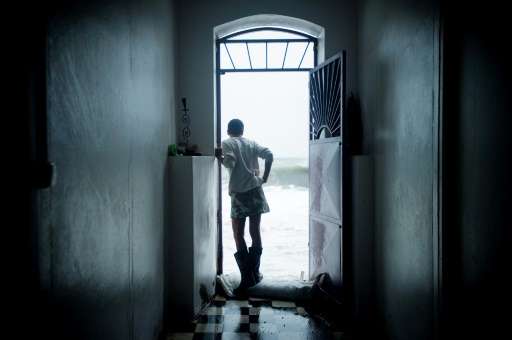Forecasters warn Hurricane Maria will remain 'extremely dangerous' as it pushes westwards in the Caribbean
Hurricane Maria closed in on the Virgin Islands and Puerto Rico Wednesday as forecasters warned of a "potentially catastrophic" storm that has already killed at least two people in the Caribbean.
The US National Hurricane Center said Maria was packing winds of up to 165 miles (265 kilometers) an hour as it approached the US and British Virgin Islands, which are still struggling to recover from devastating storm Irma.
Maria was set to remain "an extremely dangerous category 4 or 5 hurricane" as it pushed on to the US territory of Puerto Rico, the NHC said, warning of "large and destructive waves".
"Puerto Rico being hit hard by new monster Hurricane," tweeted US President Donald Trump.
"Be careful, our hearts are with you—will be there to help!"
Puerto Ricans were scrambling to board up windows and buy last minute supplies as the storm loomed over the densely populated island of 3.5 million.
Locals in the US Virgin Islands reported horizontal rain and trees swirling in the wind.
"Very violent and intense right now as we have just begun to experience hurricane force winds," said 31-year-old Coral Megahy, hunkered down on the St Croix island.
"We can hear debris banging on the aluminium windows as well."
Maria has already ripped through several Caribbean islands, leaving at least two people dead in the French territory of Guadeloupe and causing major damage in Dominica.
Satellite image of hurricane Maria's passage across the Caribbean
Culebra, Vieques and parts of the Dominican Republic are also on alert.
'Storm of the century'
Puerto Rico has opened some 500 shelters with the capacity to take in 67,000 people, as Governor Ricardo Rossello warned residents to brace for "the worst storm of the last century".
"I'm not denying I'm scared," said Noemi Aviles Rivera, a 47-year-old schoolteacher who experienced Hurricane Hugo in 1989 and Georges in 1998.
"I feel worried because it's the first time I'll see a hurricane of this magnitude."
Rossello tweeted that more than 11,000 people had sought shelter already, with nearly 200 pets in tow.
In Guadeloupe, one person was killed by a falling tree as Maria hit, while another died on the seafront.
At least two more are missing after their boat sank off the French territory, while some 40 percent of households in the archipelago of 400,000 were without power.
At least 11,000 people have sought shelter on the US territory of Puerto Rico
On neighboring Dominica, Prime Minister Roosevelt Skerrit posted on Facebook that there were initial reports of "widespread devastation".
Communications to the tropical island of 73,000 people have been cut, and its airports and ports have been closed.
'Relentless catastrophe'
There had been fears that Maria could wreak fresh havoc on islands that were already flattened by maximum Category 5 hurricane Irma earlier in the month.
Early reports suggested St Martin, a French-Dutch island that was one of the worst hit by Irma with 14 dead, had escaped the worst this time around.
"Compared to Irma this was a breeze," Gordon Snow, editor of the Daily Herald newspaper, told the radio station Paradise FM.
Britain, France and the Netherlands boosted resources for their overseas territories in the Caribbean ahead of Maria, after heavy criticism of poor preparations for Irma.
UK Commonwealth minister Alan Duncan told BBC radio the region had suffered "a fortnight of relentless catastrophe", with nine killed in the British Virgin Islands.
Maria comes hot on the heels of record-breaking Hurricane Irma, which killed at least 40 people across the Caribbean earlier this month
But he added: "Although the fear is that these islands are going to get another hit, it looks at the moment that the British Virgin Islands will not get hit as hard as they did before."
All three European countries have increased their troop deployments to the region after complaints of looting and lawlessness after Irma, though security has largely been restored.
Building supplies were hurriedly flown in to help islanders repair roofs torn off by Irma, which left 40 dead across the Caribbean and 58 more in Florida.
Irma broke records this month by whipping up winds of 295 kilometers per hour for more than 33 hours straight.
French President Emmanuel Macron told the UN General Assembly in New York that the lethal sequence of hurricanes—Irma and Maria came after Harvey blasted through Texas—was "one of the direct consequences of global warming".
The French leader is pushing US President Donald Trump to reverse his decision to pull out of the 2015 Paris climate accord, which triggered an international outcry.
© 2017 AFP



























